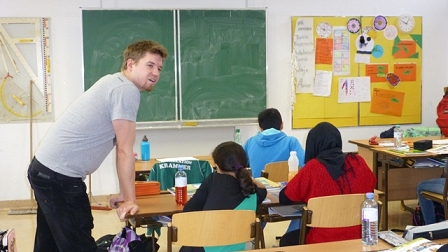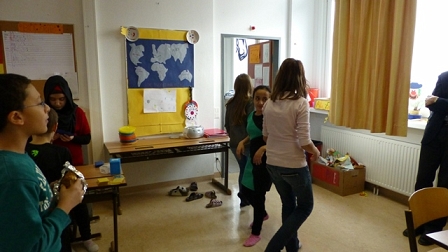Erstellt am: 13. 4. 2013 - 08:00 Uhr
Teaching For Change
Subscribe to the Reality Check podcast and get the whole programme after the show.
During the mid-morning break it`s loud at the Florian-Hedorferstraße middle school in Vienna`s 11th district, very loud indeed. “That`s good!” says Teach for Austria fellow Mathias with a smile. “Why shouldn`t kids expend a bit of energy between lessons?” There are kids running around in the corridors and in Mathias’ classroom Balkan music is blaring out of a small hi-fi. A group of 11-year old girls have gathered in a circle performing a rather elaborate group dance.
This is a multi-ethnic classroom in a multicultural area of Vienna. One of the girls has a headscarf. They smile when Mathias, their teacher, enters the room. It is an informal scene – everyone in this school is “per du” – but the friendly atmosphere doesn’t seem forced. One of girls, Nour, tells me with wide eyes that “it’s fun learning with Mathias.” Patrick, a small boy with an earnest look, agrees, adding that “When I ask Mathias for help, I know he will always help me.”

chris cummins
Mathias isn`t a classically-trained teacher. He studied social economics but decided to take part in the Teach for Austria project, which is in the middle of its first year as a part of the Austrian school system. He and others like are him are not there to replace the traditional teaching corps. The scheme aims to recruit high-achieving university graduates and put them to work teaching children from underprivileged backgrounds in what are often regarded as “challenging” schools. They get five weeks of training in a summer institute and then take up a two-year commitment.
It`s a big ask of the participants, who are known as ‘fellows’ but it seems to work because they receive mentoring throughout the year and because of the rigorous selection process that tests both their social skills and their idealist commitment to the project. Mathias was one of the successful 25 Teach for Austria fellows chosen from around 500 applicants. One has dropped out, but the rest are plying their adopted trade in several schools in Vienna and Salzburg. They’re paid by the Austrian state as regular teachers.
According to Andrea Pöschner, the headmistress of the Florian-Hedorferstraße, Mathias is respected as an equal by the rest of the teaching staff. “He has that extra 10% you need to be a good teacher,” she says, “It is not just about communicating knowledge, it is about creating a relationship with the kids.”
The idea is an off-shoot of Teach for America which was founded by Wendy Kopp in 1989 with the aim of “fighting educational inequity by enlisting high-achieving recent college graduates and professionals to take at least two years out of their career paths to teach in schools in low-income areas.” A quarter of a century on, Wendy, who was an undergraduate when she dreamed up the project, still beams with a reformer’s energy as she explains the concept.
Recent OECD reports have confirmed her suspicion that pupils’ socio-economic background still largely determines their chances of academic success. She says it’s is an “on-going scandal” and remains “one of the biggest challenges facing our societies today”. Kopp sees the organisation she founded as a powerful way to help to bridge the gap. Austria is the latest of 25 countries to launch an affiliated scheme,
“These programmes are in fact shaping leaders who end up having a sustained and significant impact on the fundamental roots of the problem,” she says.
In the USA, she points out, two-thirds of the 30,000 Teach for America alumni are working full time in teaching now. “No one could have predicted that. These weren`t people who were heading into educational jobs.” The former fellows are often running schools themselves or working in the educational authorities on a local or national level.

chris cummins
One of the fellows of Teach for Austria is 33-year old Mediah. She was studying in the USA when she came across the American programme. “I was fond of the idea and wished it existed in Austria where I felt it was really needed and then after a bit of internet research I realised Teach for Austria had been founded. I applied immediately.”
There has been criticism of the Teach for America model. New York Times journalist Michael Winerip suggested it had become become an elite brand that will help build a résumé, whether or not the person stays in teaching." And in the Washington Post a former fellow suggested they were being used to replace full time teachers while another teacher vowed that "Until Teach For America becomes committed to training lifetime educators and raises the length of service to five years rather than two, I will not allow TFA to recruit in my classes."
The Austrian branch was founded by Walter Emberger. he insists that his fellows are not taking work away from Austria`s traditionally educated young teachers. “There is a teaching deficit in this country and there will be for at least a decade. We are actually being asked if we can provide more fellows.” There are plans to expand the programme to include other Austrian provinces as of next year.
If you want to take part, the last deadline for the “Fellow-Programm” is 28th April.
Teach for Austria is holding an information evening on 16th April at Uni Wien, Insitut für Anglistik at 6pm where you can meet the organizing team as well current fellows.
And on 17th April Teach for Austria will be at the job fair of the Technische Universität (“TUday13”) from 10-11am.
Mediah, whose background was cultural anthropology, was attracted by the idea of working in schools with a high ration of migrant backgrounds. Another fellow, 29 year old scientist Olivia says this aspect of the work makes the job interesting but also challenging. There are often conflicts between different groups, she says, but that discord, and her success in resolving it, has made sense of the experience: “I`d like to show them that if we work together we can achieve much more and that we can learn from one another.”
“There are many reasons to take part,” says Wendy Kopp, “but there is no doubt that is very challenging. You`re working with kids who face all of the greatest difficulties that society can offer. For the teachers, who are trying to make up for all that is not working in the lives of the kids, it`s a big challenge.”
The fellows admit that the first few days were daunting, but that they were motivated by the response. “I think you have to be idealistic and have confidence that at one point things are going to start to go well,” says Mediah. For her the turning point was when she arrived in the classroom and saw from the smiles on the pupils’ faces that they were pleased to see her. “You can see when they are enthusiastic about learning and then you know you are on the right path.”
Olivia had a difficult girl in her class who was being disruptive, but she then sat down with her and told the girl she had real potential and, after that brief pep talk, the girl was transformed: “She said no-one had ever told her that before. A few weeks later she came to me and said she wanted to be the first person in her family to graduate from school.”
Such pep talks are only a few minutes of the fellow`s life, but such encounters have the power to help shape the futures of Austria`s most vulnerable pupils. “It`s amazing when you can see what someone can do if you just believe in them,” says Olivia, “It is truly inspiring.”
Die Show für 7 Tage als Stream
Dieses Element ist nicht mehr verfügbar


